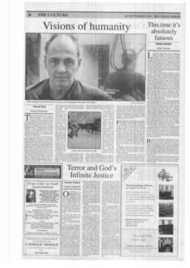Page 1, 28th September 2001
Page 1

Report an error
Noticed an error on this page?If you've noticed an error in this article please click here to report it.
Tags
Share
Related articles
Peace Will Prevail Over Evil, Says Pope I Iri ) Eoheecsi...
How ‘lolek’ Inherited The Keys Of St Peter
Pope To Meet Orthodox Head In The Holy Land
`a Defeat For Humanity'
John Paul Ii To Launch Islamic Peace Quest After Attacks...
'I beg God to keep the world in peace'
II John Paul II makes a dramatic intervention as the world prepares for allied strikes III US holds off military assault while 81-year-old Pontiff visits central Asia
BY BRUCE JOHNSTON
THE POPE stole the limelight from the West's preparations for war at the weekend, by calling — from deep in the heart of Asia, and close to Afghanistan — for Christians and Muslims to work together for peace.
On his arrival in ICazakhstan on the first leg of a four-day Apostolic trip, which later took in Armenia, John Paul II called for conflicts to be solved by dialogue and brotherhood among monotheistic religions.
He attacked hatred, fanaticism and religious fundamentalism, saying they "profaned the name of God". and warned that God should "never become hostage to men".
During Mass on Saturday in an open square dedicated to the fatherland in the Kazakh capital of Astana, the Pontiff, 81, preached on the "absolute oneness of God", to a crowd of 30,000, most of whom were non-Catholics.
This oneness, he said, was a truth which Christians had inherited from the children of Israel and which was shared with the faithful of Islam.
He asked people to pray for Christians and Muslims to collaborate "day after day, side by side, in the humble smith for the will of God" and in the interests of peace. Afterwards, during the Angelus, the Pope invited Christians and Muslims to join him in a quest "for God to keep peace in the world".
And later, at a visit to the Eurasia University, he told students in Russian: "I am happy to meet you, the descendants of the noble Kazakh people, proud of your indomitable yearning for freedom, which is as limitless as the Steppes where you were born. You come from different backgrounds, in which suffering played a big part.
"Hem you sit side by side, in a spirit of friendship, not because you have forgotten the evil there has been in your history, but because you are rightly more interested in the good that you can build together. There is no true reconciliation which does not lead to generous shared commitment.
"Realise that each one of you is of unique worth, and be ready to accept one another with your respective convictions as you search together for the fullness of truth. Your country has experienced the deadly violence of ideology."
The importance of his "visit of peace" was underlined on his arrival in the predominantly Muslim country, when he was welcomed by President Nursultan Nazarbayev — who is opposed to the Taliban — and the Grand Mufti Shortly before leaving Kazakhstan for Armenia on Monday, he condemned terrorism and religious fundamentalism, saying that they violated "the name of God", and disfigured "the image of man".
The Pope said Catholicism respected Islam, provided that it was "the real Islam", in some of the strongest comments he has made in connection with the current international crisis.
Such respect, the Pope said, was for "the authentic Islam: the Islam that prays, and stands by those in need".
In what seemed to be a veiled reference to Afghanistan, he said that the nature of "those lands" of central Asia was harsh, and its history marked by vicissitudes which had provided fertile ground for theological introspection. But this in turn could not be allowed to lose touch with the fundamental needs of human life.
"The wide-open spaces of your plains," he said, "the sense of human fragility, fuelled by the unleashing of the tbrces of nature, and the perception of the mystery hidden behind phenomena felt by the senses, all these favour in your people an opening to the fundamental questions of man and the exploration of meaningful answers for the universal culture."
lie added: "By the same token, if religion does not apply the same existential questions to itself, then it loses contact with the real world."
And just as societies guaranteed people a freedom of conscience, irrespective of their sex, race, or nationality, so they should guarantee a freedom to believe and to "publicly express their faith".
Scheduled long before the tennr attacks, it quickly became evident that the Pope's visit to Kazakhstan, where there are only 180,000 Catholics out of a population of 16 million, would help to define Vatican policy in response to the world crisis.
It had been widely expected that because of the attacks the visit would be called off. But the Pope made it clear from the outset that he was determined for the trip to go ahead.
On Saturday he was welcomed by non-Christians in spite of mounting tensions between the West and much of the Islamic world.
"Holy Father we are expecting you in in Uzbekistan," read one large banner in English that could be seen amid the throng.
Earlier, the Pope's spokesman, Joaquin NavarroValls, said that because of the new international climate, the Pope's visit to Kazakhstan, where them were many minorities, had assumed "a new, symbolic dimension, in which he can urge people to live together".
The Pope appeared tired and worn during his visit, and on his journey it did not go unnoticed that, unlike on most other occasions, he failed to exchange his customary words with reporters.
Given his fatigue, and the impor4u1ce which his messages of peace acquired while the developed world prepared for war, the Apostolic trip to a country with such a tiny Catholic minority stood out as a highlight of his extraordinary papacy.
As soon as the Pope's flight touched down in Astana, America decided there would be no attack on Afghanistan until he left the region.
The Vatican strongly denied having asked for this consideration, however.
Dressed in a red cloak and white cardigan to fend off the biting wind, the Pontiff delivered a first message of peace in Russian, while he was still on the tarmac after being helped off the plane in Astana.
He praised Kazakhstan for its decision to renounce nuclear weapons and to ban atomic experiments.
Continued on Page Four
blog comments powered by Disqus













